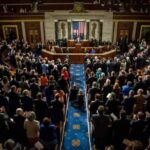Bank of America Securities has raised its price target for Nvidia (NASDAQ: NVDA) from $150 to $160, citing growing demand from sovereign artificial intelligence (AI) infrastructure projects.
The firm believes these government-led initiatives, such as Saudi Arabia’s AI investments, could help offset future revenue losses from U.S. chip export restrictions to China starting in 2026.
Nvidia shares closed at $135.34 on Wednesday, up $5.41 (4.16 percent) on the back of the revised price target and Saudi AI deal headlines. However, in pre-market trading Thursday, NVDA dipped to $132.78 (down 1.89 percent), placing it roughly 20.5% below Bank of America’s new $160 target.
Sovereign AI projects could drive $5 billion per year in revenue
Nvidia recently announced multi-year AI infrastructure partnerships with Humain, a subsidiary of Saudi Arabia’s Public Investment Fund, alongside rival chipmaker AMD. According to BofA estimates, these sovereign deals could generate between $3 billion and $5 billion annually, or up to $20 billion over multiple years.
The bank sees sovereign AI as a rapidly growing market segment, projecting it could represent more than $50 billion in annual global spending, around 10 to 15 percent of the total AI infrastructure market, which is estimated at $450 to $500 billion.
BofA analysts also highlighted Nvidia’s expected $7 billion in direct contract value, with Phase 1 of the Saudi partnership alone including 18,000 Blackwell GPUs worth roughly $700 million. Over the next five years, they anticipate several hundred thousand of Nvidia’s most advanced GPUs will be delivered to sovereign customers.
“Sovereign AI nicely complements commercial cloud investments,” the firm wrote, adding that these projects focus on training large language models (LLMs) tailored to local culture and language, while also mitigating issues like limited U.S. data center power and restrictions on China exports.
Analysts split on NVDA outlook this week
Bernstein analyst Stacy Rasgon weighed in on the news, calling it a strong signal of continued demand for high-end AI hardware:
“For investors worried about AI capex sustainability, we now have another deep pocketed customer willing and capable to spend large amounts of money on a clearly strategic push as Saudi Arabia attempts to position itself as a regional and global AI hub,” he wrote in a note to investors early Wednesday.
Although BofA raised its expectations, sentiment across Wall Street has been mixed. On Monday, UBS lowered its price target from $180 to $175. On Tuesday, DA Davidson reiterated a Neutral rating with a steady target of $120.
While Nvidia still faces macro risks and competition from AMD, analysts believe sovereign AI spending could become a powerful long-term driver. With billions already committed and large-scale GPU deployments in the pipeline, BofA sees government contracts as a critical complement to commercial cloud demand and a key factor supporting Nvidia’s elevated valuation.
Featured image via Shutterstock








